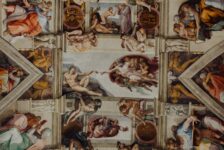Intelligent design was the buzzword of creationists in the 2000s. It was and is an attempt to smuggle creationism into classrooms under the guise of science, concerned with fictionalizing the machine and advanced technologies with a version of messianic exorcise where age-old notions of the good and evil spirits are selected and matched. Science at the service of what Daniel C. Dennett called “the machinery of religion” in a public lecture.
The intelligent ‘design’ theories have two forms, “the macro and micro,” stressed Christopher Hitchens in God is not Great (2007) for the encounter of “the primitive human” stumbling across a ticking watch: “He may not know what it is for, but he can discern that it is not a rock or a vegetable, and that it has been manufactured, and even manufactured for some purpose”. Hitchens confronted the debates from design with a critique that is never untimely. A decade following his death, similar views continue to be based on the religious takes on the incorporated data in the machine:
Fish do not have fins because they need them for the water, any more than birds are equipped with wings so that they can meet the dictionary definition of an ‘avian.’ It is exactly the other way about: a process of adaptation and selection. Let no one doubt the power of the original illusion.
The intelligent design theory presumes possible forms and patterns of resemblances and similitude, if not exactitude, that might yield a prescribed religious narrative or expectation from the machine. It also borrows from the non-corporeal data in the machine for projecting fictional incorporations to it. These turn out to be allusions of the design theory. Obviously, it lacks the analysis of what may be hypothesized scientifically, but pretends to be “objective”. The theoretical vice of the intelligent design mindsets must be renounced due to the scientific question in these fictions.
Protein, the scientific prerequisite for life beyond the Earth, would rather make a satirical allegory in theory. The design rationality reverses and replaces this prerequisite of protein with something that has protein in it, say pancakes, in the following syllogism: “Pancakes on another planet, life there. That’s what God wanted.” Halal and kosher.
William Shakespeare starts his voyage to an unknown land, in a mistaken play at sea: “In rage deaf as the sea, hasty as fire.”
For fictionalizing material reality, life on the machine or another planet, there has to be more than two to negotiate the pancake. Three, for instance, would make society: the third incorporates the God’s eye-view to affirm life as its own creation. Not two, two do not make life. Two make a sin. There has to be the third, the eye of the other for the Truth of the pancake to function: the ideological fictions of life, events and happenings. Pancake as a prerequisite to see if there’s life on another planet could make a case for the religious narrations of material realities.
“Exceptional claims demand exceptional evidence,” expressed Hitchens. Indeed, religions demand immunity from testing with scientific standards. There is no scientifically applicable God Theory, not even an Intelligent Design, nor the Pancake Theory of life beyond the earth on a machine or another planet.
There used to be theories that were not laws, which were theorized with scientific methods. The big bang theory was a means of fictionalizing, supported by the scientific discourses. There’s no such law as “The Scientific Law of the Big Bang”. But it is almost certainly a law, which is the beauty of science: there’s that narrow interval to test the hypothesis if the Big Bang is true or false. True makes a theory. Applied for the monotheistic God or mythical deities, the hypothesis would fail by default, diagnosing the belief as a delusion of the prophets.
A great number of phenomena conceived in these religious discourses just mean nothing. This should not exclude them from hypothesis testing in the scientific discourses, which know that intentionality is inherent in its object. Testing would render creationist discourses insignificant, a scientific rejection of the pancake theories alike.










